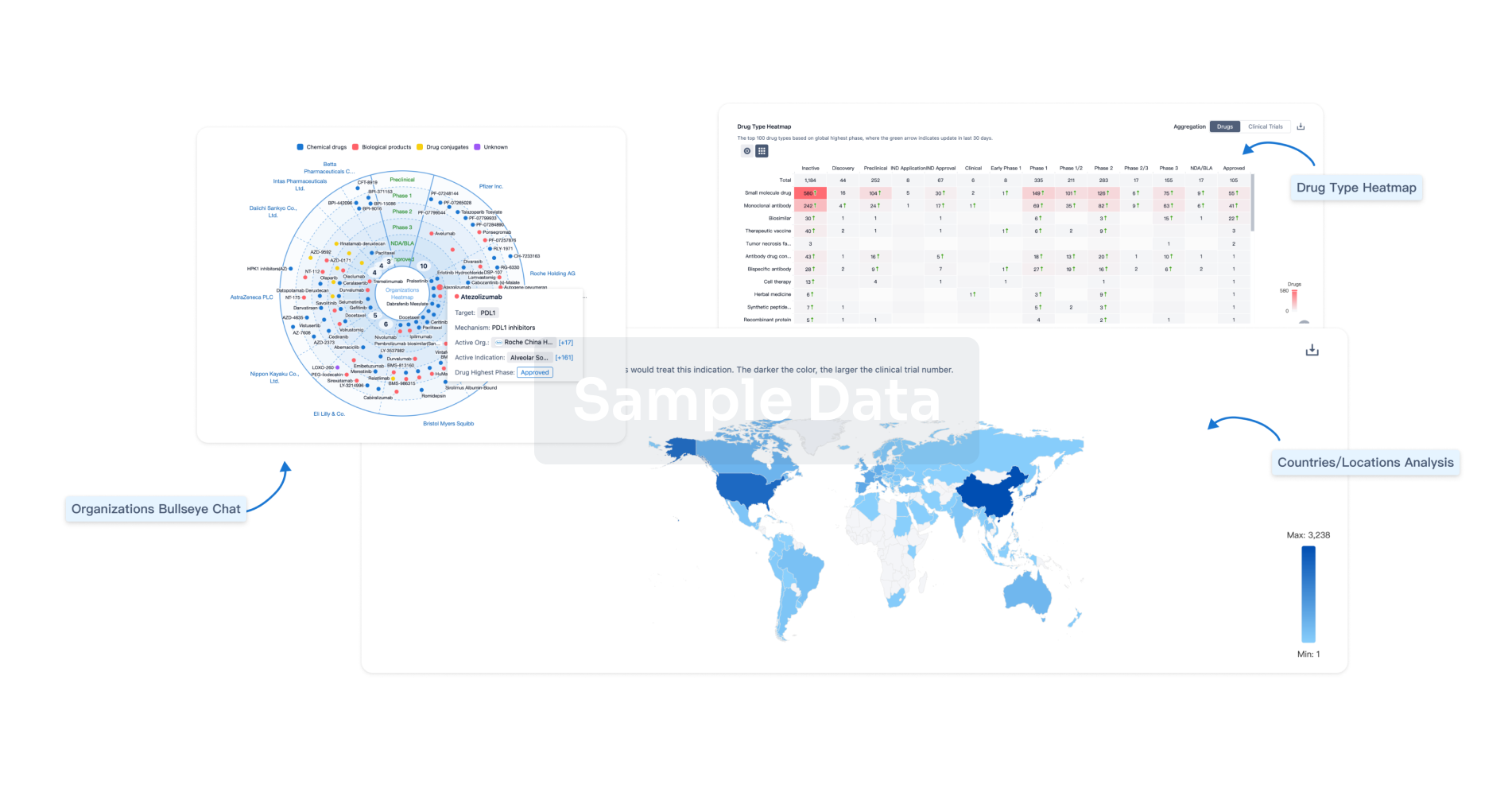Request Demo
Last update 08 May 2025
Tonsillar Neoplasms
Last update 08 May 2025
Basic Info
Synonyms CA - Cancer of tonsil, Cancer of Tonsil, Cancer of the Tonsil + [83] |
Introduction Tumors or cancer of the PALATINE TONSIL. |
Related
1
Drugs associated with Tonsillar NeoplasmsTarget |
Mechanism HER2 antagonists [+2] |
Active Org. |
Originator Org. |
Active Indication |
Inactive Indication |
Drug Highest PhaseNDA/BLA |
First Approval Ctry. / Loc.- |
First Approval Date20 Jan 1800 |
39
Clinical Trials associated with Tonsillar NeoplasmsNCT06915038
Circulating Tumor HPV DNA Driven Adjuvant Treatment Deintensification After Transoral Surgery for HPV-Positive Squamous Cell Carcinoma of the Oropharynx
This study is a prospective phase II trial, designed to assess the efficacy and feasibility of adjuvant treatment deintensification guided by ctHPVDNA levels for patients with HPV+OPSCC who undergo transoral surgery and neck dissection.
Start Date01 May 2025 |
Sponsor / Collaborator |
NCT06311877
Effects of Flavor Modification for Management of Radiation Induced Dysgeusia in Head and Neck Cancer Patients
Intervention for dysgeusia in head and neck cancer patients undergoing radiation therapy. This research proposal aims to investigate potential benefits of mBerry in improving quality of life and nutritional outcome in head and neck cancer patients' post-radiation therapy. Our hypothesis is that cancer patients undergoing radiation therapy will benefit from use of miracle berry in treatment of dysgeusia.
Start Date08 Sep 2024 |
Sponsor / Collaborator |
NCT06167291
Phase II Randomized-registry Embedded Study of Lymphoscintigraphy for Oropharyngeal Neoplasms to Enable Risk-adapted Nodal Guidance for Robotic Surgery and/or Radiotherapy (LONE-RANGR2)
To test a new radiation treatment design based on where your cancer is located. Most participants with oropharyngeal cancer are treated with radiation to both sides of the neck. However, for participants with oropharyngeal cancer on one side of the neck, receiving radiation to both sides of the neck may result in increased side effects and radiation exposure. This study is testing the safety and effectiveness of an approach that involves radiation to only one side of the neck in an effort to reduce the overall amount of radiation given and decrease the amount of side effects you may experience.
Start Date19 Apr 2024 |
Sponsor / Collaborator |
100 Clinical Results associated with Tonsillar Neoplasms
Login to view more data
100 Translational Medicine associated with Tonsillar Neoplasms
Login to view more data
0 Patents (Medical) associated with Tonsillar Neoplasms
Login to view more data
1,385
Literatures (Medical) associated with Tonsillar Neoplasms01 Oct 2025·Journal of Stomatology, Oral and Maxillofacial Surgery
Impact of contralateral occult neck metastasis in HPV-associated tonsil cancer: Is elective contralateral neck dissection required?
Article
Author: Bang, Jooin ; Lee, Oh-Hyeong ; Kim, Geun-Jeon ; Sun, Dong-Il ; Kim, Sang-Yeon
01 May 2025·Annals of Otology, Rhinology & Laryngology
Improved Visualization of Oropharyngeal Tumors Using Simple Maneuvers During Flexible Endoscopy
Article
Author: Finegersh, Andrey ; Damrose, Edward ; Montalbaron, Michael ; Bedi, Nikita ; Paderno, Alberto ; Lee, Jake J. ; Rahman, Arifeen S. ; Chen, Michelle M. ; Wang, Vickie J. ; Holsinger, F. Christopher
07 Mar 2025·Zhonghua er bi yan hou tou jing wai ke za zhi = Chinese journal of otorhinolaryngology head and neck surgery
[Retropharyngeal lymph node metastases from head and neck cancer removed by transoral robotic surgery].
Article
Author: Zhang, Q ; Yang, A K ; Liang, F Y ; Han, P ; Chen, S W ; Lin, P L ; Huang, X M ; Song, M
5
News (Medical) associated with Tonsillar Neoplasms04 Mar 2025
TUESDAY, March 4, 2025 -- Many Americans remain unaware of the cancer risk for both men and women posed by human papillomavirus (HPV), a new Ohio State University poll has found.
Most people don’t know much about
HPV
and its long-term cancer risks, and also have key misperceptions about how the virus is spread, the poll found.
For example, the majority of people are unaware that the virus is more common among men than women, and is associated with rising rates of cancers that directly impact men.
Instead, people still see HPV as mostly associated with
cervical cancer
risk in women, and shrug off the importance of vaccination for men, results show.
This lack of awareness might explain why HPV vaccination rates have been slow to increase, researchers said.
“We have a vaccine that has been shown to reduce the risk of HPV infection by up to 90%,”
Electra Paskett
, a cancer control researcher with the Ohio State University Comprehensive Cancer Center, said in a news release.
“This is a powerful tool for cancer prevention that has only been available to us in the past few decades, and we are seeing the impact of those vaccines now through the scientific data,” she added.
The federal Healthy People 2030 goals call for at least 80% of teens to be vaccinated against HPV by the end of the decade, according to the
National Cancer Institute
.
But only about 57% of boys and 61% of girls have gotten the HPV vaccine, the NCI says.
For the survey, Ohio State researchers asked people if they agree or disagree with basic statements about HPV. Responses showed an astonishing lack of knowledge.
For example, about 42% of people believe HPV is more common in women than in men, the poll found.
“This is concerning because more men are infected with HPV than women and they could unknowingly spread it to their partners,” Paskett said.
Likewise, nearly half of respondents (45%) didn’t know that HPV is linked to cancers other than cervical cancer in women.
In fact, HPV does cause more than 9 out of every 10 cases of cervical cancer, but the virus also causes cancers of the penis, anus, head and neck among men, according to the
U.S. Centers for Disease Control and Prevention
.
About 4 out of every 10 cases of cancer caused by HPV occur among men, the CDC says. Every year, more than 15,000 American men develop cancers caused by HPV.
There also have been rapidly rising rates of HPV-related tonsil and tongue base cancers, noted
Dr. Matthew Old
, a head and neck surgeon with the Ohio State University Comprehensive Cancer Center.
These cancers could become one of the top three cancers among middle-aged U.S. men 45 to 65 by 2045, and the most common cancer in elderly men in the next 10 years, recent estimates suggest.
In the new survey, 40% of poll respondents believed that people with HPV have symptoms. In truth, HPV infections are largely silent for years, with symptoms developing only after the virus has caused cancer.
“It can take years or even decades for the genetic changes caused by HPV to take effect and transform into cancer,” Old said in a news release.
CDC stats show that the vaccine has been effective in cutting down on HPV since its approval for girls in 2006 and subsequent approval for boys in 2009.
Infections with the HPV strains that cause most cancers have dropped 88% among teen girls and 81% among young adult women, the
CDC
says.
HPV is sexually transmitted, and once someone is infected there are no drugs that will rid them of the virus, experts said.
The HPV vaccine,
Gardasil 9
, is recommended between ages 9 and 12 for maximum effectiveness, prior to potential exposure, Paskett said. However, she added that the vaccine also is now available to adults up to age 45.
“Many who are unvaccinated unknowingly carry and spread high-risk strains of the virus,” Old said. “That’s why vaccination is so important.”
Whatever your topic of interest,
subscribe to our newsletters
to get the best of Drugs.com in your inbox.
VaccineDrug Approval
26 Aug 2024
NEW YORK--(
BUSINESS WIRE
)--Delcath Systems, Inc. (Nasdaq: DCTH) (“Company” or “Delcath”), an interventional oncology company focused on the treatment of primary and metastatic liver cancers, today announced the publication of an independent study conducted by investigators at the University Hospital of Leipzig, Germany, in the European Society for Medical Oncology journal of Gastrointestinal Oncology. The study, titled “Hepatic chemosaturation with melphalan in patients with primary or secondary liver tumors with or without extrahepatic tumor manifestation,” highlights the efficacy and safety of repeated chemosaturation treatments using Delcath’s CHEMOSAT
®
Hepatic Delivery System.
Key Findings from the Independent Study:
Patient Population:
This retrospective study evaluated the efficacy of CHEMOSAT in 33 previously treated patients with unresectable intrahepatic metastases from various cancers: uveal melanoma (N=19), cholangiocarcinoma (N=8), hepatocellular carcinoma (N=2), and one patient each with ciliary body melanoma, acinar cell carcinoma, pancreatic cancer, or tonsil cancer (N=4). In addition to hepatic metastases, 7 out of 33 patients also had limited extrahepatic disease, which was found not to significantly impact overall survival.
Disease Control Rate:
The study reported a disease control rate (DCR) of 91%, with 30 out of 33 patients experiencing either objective tumor response or stable disease. Notably, 6 patients (18.2%) achieved complete response (CR) in the liver, including 5 patients with uveal melanoma and 1 patient with cholangiocarcinoma, who received a median of 5 treatment cycles.
Hepatic Progression-Free Survival:
Median hepatic progression-free survival (hPFS) was 52 weeks across all patients, with particularly strong outcomes for specific cancers:
69 weeks (16 months)
median hPFS in patients with uveal melanoma.
38 weeks (8.5 months)
median hPFS in patients with cholangiocarcinoma.
Importance of Repeated Treatments:
The investigators’ approach of using CHEMOSAT in the form of regularly repeated treatment cycles as clinically indicated (Figure 1), similar to systemic chemotherapy, resulted in long-term disease control in the majority of patients and was well tolerated.
Tolerability and Safety:
The safety profile of CHEMOSAT was consistent with published literature. Most patients experienced transient hematological adverse events, which were routinely managed with supportive care. Importantly, no significant liver damage was reported, even in patients who underwent multiple treatment cycles. Treatment was discontinued in 2 patients due to adverse events, and 2 patients withdrew consent during the treatment period.
Dr. Vojislav Vukovic,
Chief Medical Officer of Delcath Systems, commented, “The results of this independent study reinforce the potential of our CHEMOSAT Hepatic Delivery System as an essential tool in the management of primary and secondary liver tumors, particularly for patients with limited treatment options. The high rate of disease control observed, even in patients with extrahepatic tumor spread, underscores the importance of continuing to explore and refine this treatment approach in larger, prospective trials.”
The publication is available
here
.
About Delcath Systems, Inc., HEPZATO KIT and CHEMOSAT
Delcath Systems, Inc. is an interventional oncology company focused on the treatment of primary and metastatic liver cancers. The company's proprietary products, HEPZATO KIT™ (HEPZATO (melphalan) for Injection/Hepatic Delivery System) and CHEMOSAT
®
Hepatic Delivery System for Melphalan percutaneous hepatic perfusion (PHP), are designed to administer high-dose chemotherapy to the liver while controlling systemic exposure and associated side effects during a PHP procedure.
In the United States, HEPZATO KIT is considered a combination drug and device product and is regulated and approved for sale as a drug by the FDA. HEPZATO KIT is comprised of the chemotherapeutic drug melphalan and Delcath's proprietary Hepatic Delivery System (HDS). The HDS is used to isolate the hepatic venous blood from the systemic circulation while simultaneously filtrating hepatic venous blood during melphalan infusion and washout. The use of the HDS results in loco-regional delivery of a relatively high melphalan dose, which can potentially induce a clinically meaningful tumor response with minimal hepatotoxicity and reduce systemic exposure. HEPZATO KIT is approved in the United States as a liver-directed treatment for adult patients with metastatic uveal melanoma (mUM) with unresectable hepatic metastases affecting less than 50% of the liver and no extrahepatic disease, or extrahepatic disease limited to the bone, lymph nodes, subcutaneous tissues, or lung that is amenable to resection or radiation. Please see the full
Prescribing Information
, including BOXED WARNING for the HEPZATO KIT.
In Europe, the device-only configuration of the HDS is regulated as a Class III medical device and is approved for sale under the trade name CHEMOSAT Hepatic Delivery System for Melphalan, or CHEMOSAT, where it has been used in the conduct of percutaneous hepatic perfusion procedures at major medical centers to treat a wide range of cancers of the liver.
Clinical ResultDrug Approval
08 Aug 2024
THURSDAY, Aug. 8, 2024 -- People who use marijuana at high levels are putting themselves at more than three times the risk for head and neck cancers, new research warns.
The study is perhaps the most rigorous ever conducted on the issue, tracking the medical records of over 4 million U.S. adults for 20 years.
Given the surging popularity of marijuana, cases of head and neck cancers "attributable to cannabis will continue to increase, and perhaps dramatically," wrote a team of oncology experts led by
Dr. Joseph Califano
of the University of California, San Diego.
Their commentary accompanied the new findings, which were published Aug. 8 in the journal
JAMA Otolaryngology-Head & Neck Surgery
.
The study was co-led by
Dr. Niels Kokot
, a professor of clinical otolaryngology-head & neck surgery at the University of Southern California (USC), in Los Angeles.
Head and neck cancers include tumors of the mouth, throat, windpipe and salivary glands. According to the
American Cancer Society
, these cancers affect more than 58,000 Americans each year, with a death toll of more than 12,000.
Kokot's team noted that cannabis, especially when smoked, is far from harmless to human cells.
Tobacco smoke has long been a big risk factor for head and neck cancers, and Kokot's team noted that "the smoke content of cannabis contains carcinogens similar to those found in tobacco."
There's also evidence that the cannabinoid compounds found in weed could have "tumor-promoting activities," although the jury is out on any definite links to cancer.
The new study focused on patient information from a major database of U.S. medical records.
Kokot's team first looked at over 116,000 records for people diagnosed with problematic "cannabis-related disorder," meaning they used the drug daily.
They compared rates of head and neck cancers in that group to those of another 4 million patients without cannabis use disorder.
"We found that the relative risk of developing head and neck cancer for those with cannabis-related disorders ranged from 3.5 to 5 times that of those without cannabis-related disorders," the researchers reported.
The study couldn't confirm cause-and effect, but the authors noted that risks tended to rise as years spent with a cannabis use disorder increased.
Risks for specific cancers could rise dramatically.
For example, chronic marijuana users had nearly five times the risk or oropharyngeal (tongue, palate, upper throat and tonsils) tumors, and more than eight times the odds for cancers of the larynx (the area of the throat around the voice box).
Smoked marijuana is probably the most carcinogenic means of ingesting the drug, the USC team said, and it
might be even more harmful than cigarette smoking
.
"Cannabis smoking is typically unfiltered and consumed through deeper breaths than tobacco," they noted.
The findings were enough to convince one head and neck cancer specialist of the dangers.
"Now we know that there is a link between cannabis use and head and neck cancer -- I would say that we've proven that link," said
Dr. Michael Blasco
. He directs head and neck oncology and reconstruction at Northwell Health in Staten Island, N.Y.
"We don't necessarily know what the threshold is that seems to greatly increase the risk, but we know that heavy users have higher rates, so I would 100 percent tell patients that there's a link between head and neck cancer and cannabis use," he said.
The new study supports the notion that marijuana is far from harmless, Blasco added.
"This is a part of a growing body of literature that's showing that there are measurable negative health effects from cannabis use," he said. "Whether that's effects on the lungs, whether that's effects on the mood and addiction. And then this is part of a growing body of literature that suggests association with cancers. So, we're learning more and more about the long-term health effects of cannabis."
Whatever your topic of interest,
subscribe to our newsletters
to get the best of Drugs.com in your inbox.
Analysis
Perform a panoramic analysis of this field.
login
or

AI Agents Built for Biopharma Breakthroughs
Accelerate discovery. Empower decisions. Transform outcomes.
Get started for free today!
Accelerate Strategic R&D decision making with Synapse, PatSnap’s AI-powered Connected Innovation Intelligence Platform Built for Life Sciences Professionals.
Start your data trial now!
Synapse data is also accessible to external entities via APIs or data packages. Empower better decisions with the latest in pharmaceutical intelligence.
Bio
Bio Sequences Search & Analysis
Sign up for free
Chemical
Chemical Structures Search & Analysis
Sign up for free




